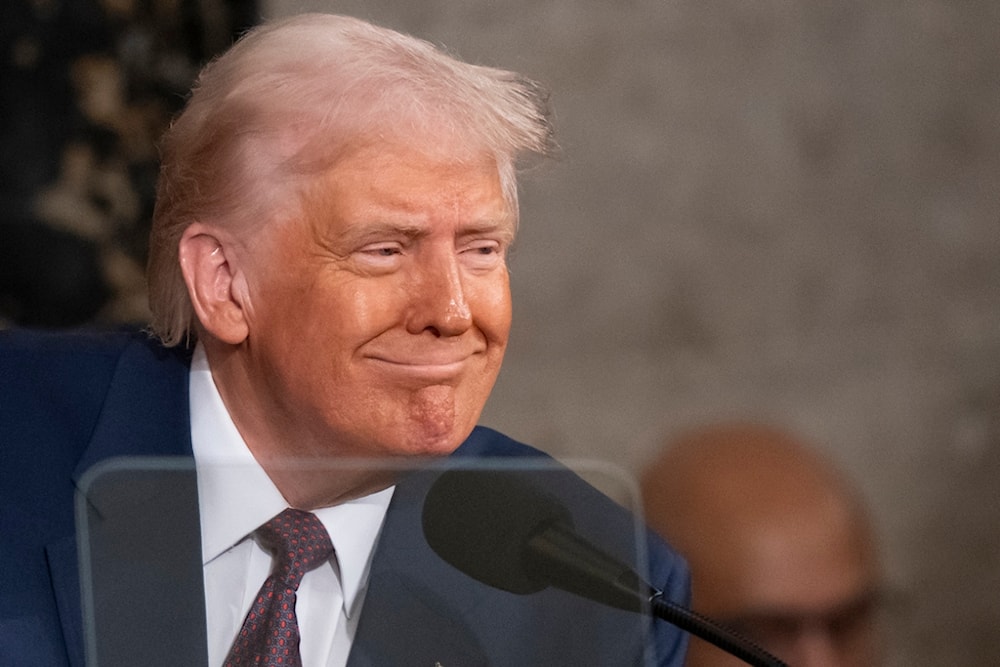Trump considering 'major change' to US participation in NATO
US President Donald Trump has long been voicing his dissatisfaction with NATO and the US's contributions to the alliance compared to other members.
-

United States President Donald Trump addresses a joint session of Congress on Capitol Hill in Washington, on March 4, 2025. (AP)
United States President Donald Trump is considering a major shift in US policy toward the North Atlantic Treaty Organization (NATO), potentially conditioning military support on alliance members meeting defense spending targets, according to multiple US officials.
One of the most significant changes under discussion is limiting US defense commitments to NATO countries that allocate a set percentage of their gross domestic product (GDP) to military spending. This would challenge NATO’s core principle, Article 5, which states that an attack on one member is considered an attack on all.
If implemented, this policy would mark a stark departure from traditional US commitments to NATO and could weaken the alliance’s collective security framework. European allies are reportedly concerned about the ramifications of such a move.
Trump is also considering prioritizing joint military exercises and troop deployments based on NATO members’ defense spending levels. The US has already signaled a potential reduction in its military presence in Europe, with discussions underway about repositioning troops to countries that meet the spending threshold.
Complaints about NATO
Throughout his presidency and campaign, Trump has been vocal about NATO’s defense spending disparities, arguing that the US bears an unfair burden. NATO members agreed over a decade ago to spend at least 2% of their GDP on defense, but Trump has pushed to increase this to 5%.
According to NATO’s latest statistics, 23 alliance members exceeded the 2% threshold in 2023, with Poland leading at 4.12%. Trump has insisted that European nations should contribute more, emphasizing that the US benefits less due to its geographic separation from potential conflicts.
Trump’s proposed NATO policy shift comes as he urges European allies to take on a greater role in supporting Ukraine against Russia. While the US continues to back Ukraine, Trump’s administration has stated that NATO membership for Kiev would not be part of any negotiated peace agreement.
While Trump’s nominee for US ambassador to NATO, Matthew Whitaker, has reaffirmed commitment to the alliance, uncertainty remains.
During his first term, Trump repeatedly questioned the US’s role in NATO and even threatened to withdraw from the alliance. He has also expressed skepticism about Article 5, which has only been invoked once—after 9/11.
NATO prepares for post-US era
Friedrich Merz, the center-right leader poised to become Germany's new chancellor, said after his election victory in late February that his "priority...will be to strengthen Europe as quickly as possible" to "achieve real independence from the USA," highlighting a growing transatlantic divide.
A coalition of pro-European political parties in the European Parliament declared in a joint statement on Tuesday that Europe can "no longer fully rely on the United States to defend our shared values and interests" and that it is "high time for Europe to step up its own security."
According to the report, those previously unthinkable statements from both conservatives and progressives echo calls from French President Emmanuel Macron, who, during his visit to Washington on Monday, advocated for European "strategic autonomy."
Many European leaders dismissed the concept of "strategic autonomy" during Trump’s first term, and the issue is now gaining serious attention in light of the war in Ukraine.
That said, Macron and British Prime Minister Keir Starmer, who will also meet with Trump this week, are among several European leaders signaling their readiness to increase defense spending as Trump steps back.
Starmer vowed to deploy troops if needed to "guarantee Ukraine's security," while emphasizing that "US support will remain critical."

 4 Min Read
4 Min Read








